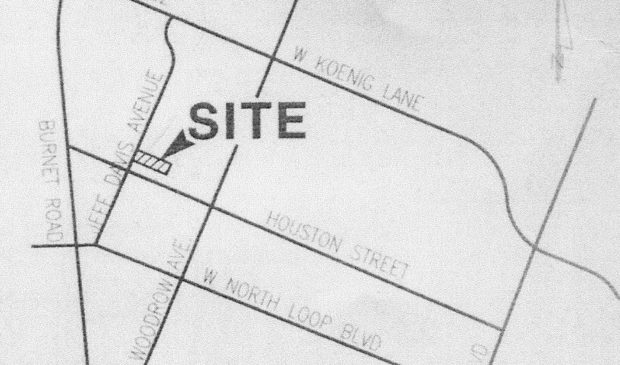Brentwood flag lot prompts density debate at Planning Commission
Tuesday, October 4, 2016 by
Jack Craver A short debate during a Tuesday meeting of the Planning Commission about a subdivision in the Brentwood neighborhood was a fitting example of the conflicting views on development at the center of city politics.
Commissioner Karen McGraw voiced concern about a variance requested by a developer to subdivide a single-family lot at 5503 Jeff Davis Ave. into two lots using the “flag lot” technique. Each lot would also include an accessory dwelling unit, meaning the current parcel would be converted into four residential units.
No neighbors had signed up to speak against the variance, which was recommended for approval by city staff on the commission’s consent agenda.
McGraw, however, worried that neighbors may not have been made aware of the proposed change.
The neighborhood plan for the area, she said, called for a mix of multifamily and single-family residences and did not address the issue of turning large single-family lots into flag lots with multiple properties. The “incremental re-cutting of the neighborhood” through flag lots, she said, had become a “serious enough situation” that the neighborhood association should be consulted and asked to develop a “more intentional position.”
Her suggestion did not sit well with Commissioner James Schissler, who suggested that whatever the Brentwood neighbors might suggest wouldn’t be helpful.
“The (goal of the) Imagine Austin plan is to try to increase density in neighborhoods, but if every neighborhood says we don’t want to increase our density – which is what always happens in these cases – nobody wants to hear another house is being built,” he said. “I’m sure what we’ll hear from the neighborhood is, ‘Yeah, we don’t want to see this subdivision go in place and four houses to replace one house.”
Accommodating that type of thinking would simply mean more building “out in Round Rock,” rather than in the urban core, argued Schissler.
Instead, he said, “We have to look at some of these neighborhoods that do have large lots and say there is an opportunity to increase the density.”
McGraw and Commissioner Nuria Zaragoza pushed back on Schissler’s assumption about the neighborhood’s position.
“(It is) not in all instances, if you ask the neighborhood if they want to add a house, that they’ll choose not to add it,” said Zaragoza. There are plenty of developments that increase density that are approved with support from neighborhood groups, she added.
Zaragoza and others, however, said that they would not support McGraw’s request for a postponement because no neighbors had signaled opposition in response to the variance request. Area residents had been notified of the upcoming development, pointed out Commissioner James Shieh.
“I think the neighborhood knows what’s going on, and they would have chimed in (if they opposed),” he said.
McGraw and Commissioner Tom Nuckols also raised concerns about the parking accommodations for the new subdivision, saying the driveway might not be “maneuverable.”
“If the driveway is not maneuverable, those cars are not going to park there – they’re going to park somewhere else,” McGraw said.
Shieh tried to assuage those concerns, saying that city staff will be further reviewing the parking space for each lot during the building plan review.
“It’s not for us to review at this point,” he said.
Commissioner Chito Vela joined the discussion with news of a recent policy paper released by the White House on promoting affordable development in cities.
“One of the recommendations is eliminating off-street parking requirements, so this is a good example of ‘it’s better to get the housing than the parking,’” he said. “We need housing for people, not parking spaces for cars.”
The motion to postpone the case until Oct. 25 failed, 2-10, with only McGraw and Nuckols in support. A subsequent motion to approve the subdivision passed 11-1, with only McGraw voting against.
The Austin Monitor’s work is made possible by donations from the community. Though our reporting covers donors from time to time, we are careful to keep business and editorial efforts separate while maintaining transparency. A complete list of donors is available here, and our code of ethics is explained here.
You're a community leader
And we’re honored you look to us for serious, in-depth news. You know a strong community needs local and dedicated watchdog reporting. We’re here for you and that won’t change. Now will you take the powerful next step and support our nonprofit news organization?









